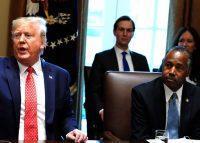As the economy strains under the pressure of COVID-19, Donald Trump is reportedly considering a plan to increase the number of EB-5 visas offered to wealthy individuals who invest in job-creating businesses.
Under the proposal, the number of available visas would jump to 75,000 from 10,000, according to Politico, which cited sources familiar with the matter. The investment threshold to earn legal residence would also be lowered, from $900,000 to $450,000.
The plan may be included in a coronavirus rescue bill, according to Politico.
The visa program has experienced its fair share of issues and controversies over the years, and the move to expand it would be significant. The White House has yet to confirm the report.
Read more



Initially designed to spur development in distressed and rural communities, the EB-5 program faced backlash because some developers used the money to construct massive projects in prime areas of Manhattan. Real estate developers in major cities used the program so much it was even referred to as the “crack cocaine of real estate finance.” Anti-immigration groups have also voiced opposition.
More than half the visa recipients who use the program come from China, and the popularity of the visa has created a significant backlog. According to a 2018 report by The Real Deal, wait times for Chinese applicants could be up to 15 years.
In an effort to clamp down on abuse of the program, new federal regulations were passed last year that effectively doubled the minimum dollar amount applicants were required to invest in development projects. [Politico] — Sylvia Varnham O’Regan
